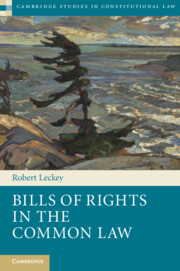Book contents
- Frontmatter
- Dedication
- Contents
- Acknowledgements
- Table of cases
- Introduction
- 1 Against bill-of-rights exceptionalism
- 2 The common law, judging, and three bills of rights
- 3 Judicial review of legislation before bills of rights
- 4 Bills of rights and other means of accessing judgment
- 5 Putting the strike-down in its place
- 6 Remedies from text to practice
- 7 Improving the system and engaging the legislature
- 8 Rethinking remedies and constitutional supremacy
- Conclusion
- Bibliography
- Index
4 - Bills of rights and other means of accessing judgment
Published online by Cambridge University Press: 05 May 2015
- Frontmatter
- Dedication
- Contents
- Acknowledgements
- Table of cases
- Introduction
- 1 Against bill-of-rights exceptionalism
- 2 The common law, judging, and three bills of rights
- 3 Judicial review of legislation before bills of rights
- 4 Bills of rights and other means of accessing judgment
- 5 Putting the strike-down in its place
- 6 Remedies from text to practice
- 7 Improving the system and engaging the legislature
- 8 Rethinking remedies and constitutional supremacy
- Conclusion
- Bibliography
- Index
Summary
This chapter complicates the story of bills of rights and changes to the judicial role, integrating judicial innovations prior to the adoption of such instruments, which bill-of-rights exceptionalism obscures. It studies the treatment of two revealing restrictions on access to the judicial process, the doctrines of standing and mootness, which participate in a shift in the judicial role, from resolving disputes towards announcing violations of rights more broadly. In a counterweight to suppositions that judges seize on a new rights instrument to augment their powers, this shift is not chiefly the product of judicial agency in rights adjudication. As the chapter recounts, in Canada and the UK, it is the result of judicial agency in transforming the role of courts in public law generally. In South Africa, it is the result of constitutional fiat. Overall, changes to the doctrines controlling access to adjudication occurred at varying times, with varying sources of authority.
The first part defines the doctrines and presents their traditional justifications, as well as the bases advanced for departing from them. The analysis of standing is especially rich, since the Canadian Charter, the UK Human Rights Act 1998, and the South African Bill of Rights address it differently. Standing thus stretches across the chapter's three following parts. The second part recounts that Canadian judges liberalized standing prior to the Charter and have done so further when applying that instrument. The third part turns to South Africa, where the constitutional drafters expanded standing for the purposes of the Bill of Rights. The fourth part addresses the United Kingdom, where the Human Rights Act appears to narrow standing relative to the approach that the judges had developed two decades prior. More briefly, the fifth part studies the doctrine of mootness or academic questions in the three jurisdictions. It reports some willingness to resolve appeals that the doctrine would traditionally bar to elaborate the meaning of new bills of rights.
- Type
- Chapter
- Information
- Bills of Rights in the Common Law , pp. 68 - 92Publisher: Cambridge University PressPrint publication year: 2015



